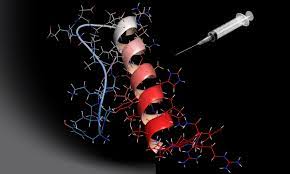The human body has an incredible capacity for healing and regeneration. This ability declines with age, injury, and disease. Researchers are now exploring the use of peptide bioregulators to tap into the body’s innate repair processes and stimulate healing, tissue growth, and longevity.
This article will provide an overview of key peptide compounds being studied for therapeutic use in healing the body, regenerating organs, building muscle, and essentially rejuvenating function. The evidence for their mechanisms, health effects, and applications will be explored. If you looking to buy peptides then you need to know the use of peptides before buying them.
Background on Peptide Bioregulators
Peptides are short chains of amino acids that act as cellular signaling molecules. Though the body produces some naturally, pharmaceutical science can synthesize peptide analogs with targeted effects. Below are classes of synthetic peptides being investigated for healing and growth.
- Thymosins – Restore immune function
- Epitalon – Anti-aging effects
- CJC-1295 – Growth hormone release
- Sermorelin – Growth hormone release
- Follistatin – Muscle growth
- BPC-157 – Accelerated injury healing
- TB-500 – Accelerated injury healing
Research remains early but initial results are promising for managing aging, improving athletic performance, and speeding post-injury rehabilitation. When sourcing peptides, quality medical grade products are recommended for safety.
Peptides for Immune System Healing
Aging diminishes immune function, increasing infection risks. Thymosin peptides show promise for restoring immunity in the elderly.
Thymosin Alpha-1
Thymosin Alpha-1 (TA-1) improved cell-mediated immunity and antibody response in elderly subjects. By stimulating T-cell and natural killer cell activity, TA-1 restored deficient immune responses. This peptide may also help treat viral infections.
Thymosin Beta-4
Like TA-1, Thymosin Beta-4 (TB-4) enhances T-cell maturation and white blood cell production in animal studies. It may rebalance immunity in immunocompromised individuals. TB-4 also assists tissue healing.
Peptides for Organ Regeneration
Cellular communication declines with age, reducing tissue renewal. Epitalon may support organ regeneration by activating telomerase.
Epitalon
This peptide mixture derived from the pineal gland lengthened telomeres and extended lifespan in human cells and animals. It also enhanced antioxidant activity and dopamine levels, showing neuroprotective properties. The anti-aging potential of Epitalon is being explored. You can buy Epithalon online as well.
Peptides for Muscle Growth
Bodybuilders use growth hormone releasing peptides (GHRPs) to support muscle growth by boosting natural growth hormone (GH) levels.
CJC-1295
CJC-1295 amplifies GH and insulin-like growth factor 1 (IGF-1) levels substantially when combined with a GHRP. This anabolic effect increased lean muscle mass in animal studies without organ enlargement. However, long-term safety requires study.
Sermorelin
This GH secretagogue elevated IGF-1 levels and was well tolerated by elderly patients in clinical trials. Sermorelin significantly increased growth hormone responsiveness and associated muscle protein synthesis for supporting lean mass.
Follistatin
Follistatin is a myostatin inhibitor that prevents muscle wasting. Mice with follistatin overexpression displayed significant muscle mass gains. Its ability to promote muscle growth in humans remains under investigation.
Peptides for Healing Injuries
Peptides like BPC-157 and TB-500 accelerate post-injury healing of tendons, ligaments, muscles, bones and skin in animal models.
BPC-157
BPC-157 rapidly improved recovery in models of tendon tears, burned skin, and broken bones when administered systemically. It recruits growth factors to injury sites to support accelerated repair. You can buy bpc 157 online as well but need to consult your doctor before.
TB-500
TB-500 (Thymosin Beta 4) enhanced wound closure, blood vessel growth, and nerve regeneration in studies. When injected into injury sites, it reduced pain and fast-tracked recovery across tissue types.
Conclusion on Peptide Therapy
Harnessing the body’s innate ability to heal itself remains a key goal of regenerative medicine. Peptide bioregulators like thymosins, epitalon, GHRPs, and tissue repair peptides show early promise for managing immune dysfunction, muscle loss, injuries, and aging decline. However, rigorous human trials are still needed to verify safety and efficacy. If proven in further research, targeted peptide therapy may support whole body rejuvenation, performance enhancement, and injury rehabilitation.

